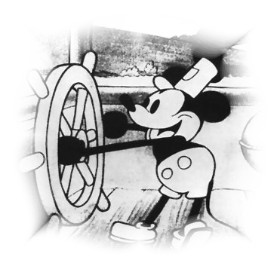|
|
|
Copyright case has implications for future of entertainment October 17, 2002 By Franklin Harris What if anyone, not just Disney, could make cartoons featuring Mickey Mouse or Donald Duck? Or what if anyone, not just DC Comics, could publish comics featuring Superman or Batman? A case argued last week before the U.S. Supreme Court could make those questions more than hypothetical.
The key phrase here is, "for a limited time." At first, creative works such as books enjoyed copyright protection for 14 years, with another 14 upon one-time renewal. After that, the works fell into the "public domain," meaning that anyone, not only the author or publisher, could reprint them without owing royalties. Over the years, Congress has extended copyright numerous times. Just prior to 1998, copyright protection lasted through the life of the author plus 50 years, or, in the case of "corporate authors," 75 years. For example, under the old law, a character like Superman, created 64 years ago, would fall into the public domain in 2013. After that, anyone would be free to use Superman — the 1938 version of him, anyway — with some restrictions. Characters like Superman also fall under trademark law, which is another matter. For example, both DC Comics and Marvel Comics publish characters named Captain Marvel. But Marvel Comics holds the trademark to the name "Captain Marvel," so only Marvel can use the Captain Marvel name on the covers of its books. But under the Bono Act, copyright holders get an additional 20 years of exclusivity. Disney was a major backer of the Bono Act because without it Mickey Mouse would have entered the public domain in 2004. The Bono Act gives Disney exclusive ownership of the character until 2024. And you can bet that before 2024 rolls around, Disney and its lobbyists will be back in Congress seeking another extension. Stanford University law professor Lawrence Lessig argued before the Supreme Court last week in Eldred vs. Ashcroft that the Bono Act violates the Constitution's "limited time" clause. Lessig says the Constitution's framers recognized the public domain to be a vital part of the cultural landscape. Ironically, the Disney empire is built on public domain works. "Snow White," "Cinderella" and "Beauty and the Beast" are not Disney creations, and Disney doesn't pay for their use. Pre-1998 copyright law gave creators a lifetime to profit from their creations, plus an extra 50 years of exclusive use to pass along to their immediate descendants. Continued expansions of copyright protection benefit only corporations (not actual creators) while depriving the public of a rich cultural heritage. Supporters of the Bono Act — movie studios, publishers and recording companies — claim the copyright extension is necessary to promote creativity. But then why do existing works need a retroactive extension? It's a fallacious argument, designed to hide the entertainment industry's real motives. Hopefully, the Supreme Court will strike down the Bono Act. After all, how much poorer would we be today if Dracula and Santa Claus were not in the public sphere, where anyone can tell stories about them? How much poorer would Disney be without Snow White? |

RECENT COLUMNS
Order a helping of Cartoon Network's 'Robot Chicken'
03/31/05
Campaign against video games is political grandstanding
03/24/05
Prize-winning author is 'Wrong About Japan'
03/17/05
Censored book not a good start
03/10/05
Some superhero comics are for 'fanboys' only
03/03/05
'Constantine' does well with its out-of-place hero
02/24/05
'80s publisher First Comics' legacy still felt
02/17/05
Director's cut gives new 'Daredevil' DVD an edge
02/10/05
Put the fun back into 'funnybooks'
02/04/05
Is 'Elektra' the end of the road for Marvel movies?
01/27/05
'House of Flying Daggers' combines martial arts and heart
01/20/05
Anniversary edition of 'Flying Guillotine' has the chops
01/13/05
Movie books still have role in the Internet era
01/06/05
Looking ahead to the good and the bad for 2005
12/30/04
The best and worst of 2004
12/23/04
'Has-been' Shatner is a 'transformed man'
12/16/04
© Copyright 2005 PULP CULTURE PRODUCTIONS
Web site designed by Franklin Harris.
Send feedback to franklin@pulpculture.net.
 Four years ago, Congress passed the
Four years ago, Congress passed the